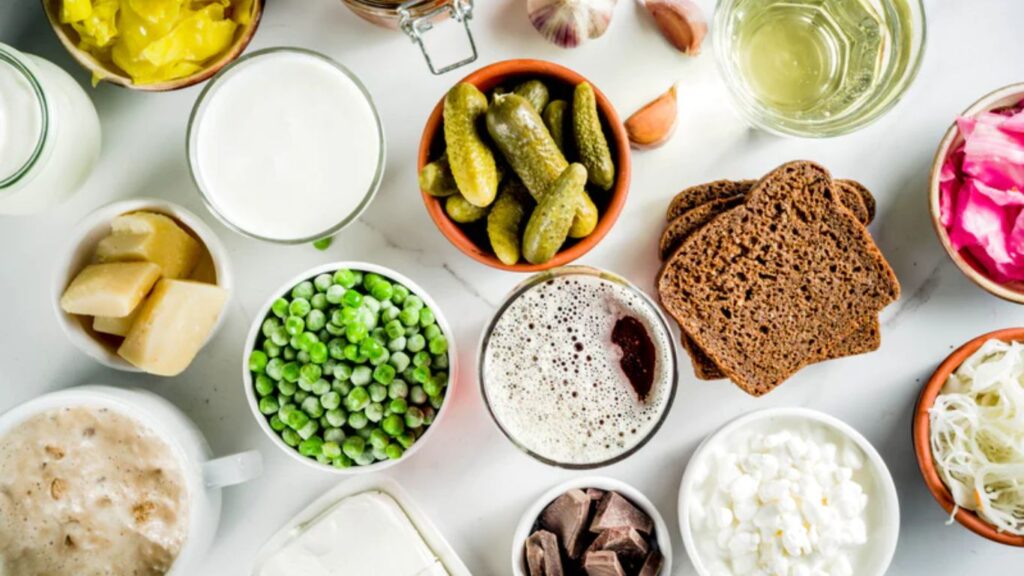The immune system is our body’s sophisticated defense mechanism against pathogens, including bacteria, viruses, and other harmful entities. It consists of a complex network of cells, tissues, and organs working in harmony to protect the body from infections and diseases. The gut microbiome, an ecosystem of microorganisms living in our digestive tract, plays a pivotal role in this defense system, influencing immune responses and overall health.
Probiotics, often referred to as ‘good’ or ‘beneficial’ bacteria, are live microorganisms that, when administered in adequate amounts, confer health benefits on the host, particularly by supporting and enhancing gut health. These beneficial bacteria are instrumental in maintaining the balance of the gut microbiota, supporting the gut barrier function, and modulating the immune system. Despite their lesser-known status in the vast arena of immune health contributors, probiotics are essential allies, playing a critical role in fortifying our body’s defense mechanisms against a myriad of health challenges.
Probiotics: The Unsung Heroes of Immune System Support
Understanding Probiotics
Probiotics are live microorganisms that, when consumed in adequate amounts, offer health benefits to the host, primarily by enhancing intestinal flora balance and contributing to gut and immune health. The most common types of probiotics include Lactobacillus and Bifidobacterium species, each comprising various strains with specific health benefits. Lactobacillus strains are widely recognized for their role in preventing diarrhea and easing lactose intolerance, while Bifidobacterium strains are known for supporting the immune system and improving gut health.
Probiotics are naturally found in fermented foods such as yogurt, kefir, sauerkraut, tempeh, and kimchi. They are also available as dietary supplements and are sometimes added to foods in an effort to enhance their nutritional profile. Beyond these sources, the human body naturally hosts these beneficial bacteria, which are part of the natural microbiome.
In the body, probiotics work by restoring the natural balance of the gut microbiota, which can be disrupted by factors like antibiotics, poor diet, or illness. They strengthen the gut barrier, preventing harmful pathogens from entering the bloodstream. Additionally, probiotics interact with immune cells, modulating the immune response to prevent overreaction to non-harmful antigens and reducing the risk of infections and inflammation. This dual action supports overall digestive health and bolsters the body’s immune defense mechanisms.
The Immune System-Probiotic Connection

Overview of the Gut Microbiome and Its Connection to the Immune System:
- The gut microbiome consists of trillions of microorganisms, including bacteria, viruses, fungi, and other microbes living in our digestive tract.
- This complex ecosystem plays a crucial role in digesting food, synthesizing vitamins, and protecting against pathogens.
- The gut microbiome and the immune system are closely linked, with about 70% of the immune system residing in the gut. This relationship is vital for developing tolerance to harmless antigens and for mounting responses to harmful pathogens.
Mechanisms by Which Probiotics Support the Immune System:
- Enhancing the Intestinal Barrier:
- Probiotics strengthen the mucosal barrier of the intestines, acting as a physical barrier against pathogens.
- They enhance the integrity of the gut lining, preventing leaky gut syndrome, where harmful substances can enter the bloodstream and trigger immune responses.
- Modulating the Body’s Immune Response to Fight off Pathogens:
- Probiotics interact with gut-associated lymphoid tissue (GALT) to modulate the immune response, ensuring it is appropriately reactive to pathogens without causing excessive inflammation.
- They can influence the activity of T cells, B cells, and dendritic cells, helping to direct the immune system’s response towards a more balanced state.
- Stimulating the Production of Natural Antibodies:
- Certain probiotic strains can stimulate the body to produce natural antibodies, increasing the body’s ability to fight off infections.
- They also enhance the production of cytokines, which are signaling molecules that help to regulate immune responses, further supporting the body’s defense mechanisms against pathogens.
Scientific Evidence on Probiotics and Immunity
Recent research has illuminated the significant impact of probiotics on immune health, underscoring their potential to prevent and mitigate infections. Key findings from numerous studies suggest that probiotics can enhance immune function, potentially leading to reduced incidence and severity of infections.
One notable study published in the “Journal of Science and Medicine” found that participants who consumed probiotics daily experienced a 42% lower risk of developing upper respiratory tract infections (URTIs) compared to those who did not. This suggests that probiotics can enhance the body’s defense against pathogens that cause common colds and flu.
Another clinical trial focused on gastrointestinal infections revealed that probiotics, particularly strains of Lactobacillus and Bifidobacterium, significantly reduced the incidence of antibiotic-associated diarrhea (AAD) and Clostridium difficile-associated diarrhea in hospitalized patients. This outcome highlights probiotics’ role in maintaining gut health and supporting the immune system’s ability to fight off gastrointestinal infections.

Moreover, research indicates that probiotics may shorten the duration of common illnesses. A systematic review and meta-analysis found that probiotics reduced the duration of common cold symptoms by approximately 1.5 days. This effect is attributed to probiotics’ ability to stimulate the production of antibodies, enhance the mucosal barrier, and modulate the immune response, leading to a more efficient clearance of viruses and other pathogens.
These findings underscore the potential of probiotics as a complementary strategy for enhancing immune health and reducing the impact of infectious diseases. Further research is ongoing to fully understand the mechanisms and optimize probiotic formulations for immune support.
Practical Tips for Incorporating Probiotics into Your Diet
Guidelines on Selecting the Right Probiotics:
- Strain Specificity: Look for probiotics with specific strains that target your health concerns, as different strains have different effects (e.g., Lactobacillus rhamnosus GG for gut health, Bifidobacterium lactis for immune support).
- CFUs: Choose products with an adequate dose, typically in the range of 1 billion to 10 billion Colony Forming Units (CFUs), to ensure effectiveness.
List of Probiotic-Rich Foods:
- Yogurt: Incorporate it into breakfast or snacks.
- Kefir: Drink it alone or blend into smoothies.
- Sauerkraut: Add to sandwiches or salads for a tangy crunch.
- Kimchi: Use as a side dish or in stir-fries for extra flavor.
- Tempeh: Marinate and use as a meat substitute in various dishes.
- Miso: Use in soups, dressings, and marinades for a probiotic boost.
Advice on Choosing Probiotic Supplements:
- Read Labels Carefully: Look for the genus, species, and strain(s), as well as the CFU count at the time of consumption, not just at the time of manufacture.
- Storage Requirements: Note any special storage instructions to maintain potency (e.g., refrigeration).
- Expiration Date: Check to ensure the product will remain effective until the end of its shelf life.
- Third-Party Verification: Consider products verified by third-party organizations for quality and potency.
Potential Considerations and Side Effects
Probiotics are generally considered safe for the majority of the population, contributing positively to gut health and overall immunity. However, potential side effects can include mild digestive symptoms such as gas and bloating. For individuals with compromised immune systems, serious health conditions, or those on critical medications, probiotics can pose risks, including infections. Therefore, it’s paramount for anyone with specific health concerns or conditions to consult with healthcare professionals before initiating any probiotic regimen. This ensures the chosen probiotic is appropriate and beneficial for their specific health needs, minimizing potential risks and maximizing benefits.

Conclusion
Probiotics stand as unsung heroes in the realm of immune support, offering a natural and effective way to enhance our body’s defense mechanisms. Through their ability to balance gut microbiota, strengthen the intestinal barrier, and modulate immune responses, probiotics play a crucial role in maintaining our health and well-being. While generally safe for most people, it’s important to select the right strains and consult with healthcare professionals to ensure their optimal use. As we continue to uncover the extensive benefits of these beneficial bacteria, incorporating probiotics into our daily routine can be a simple yet powerful step towards better immune health.
Also read: The Miraculous Benefits of Tulsi Leaves: Nature’s Best Kept Secret
